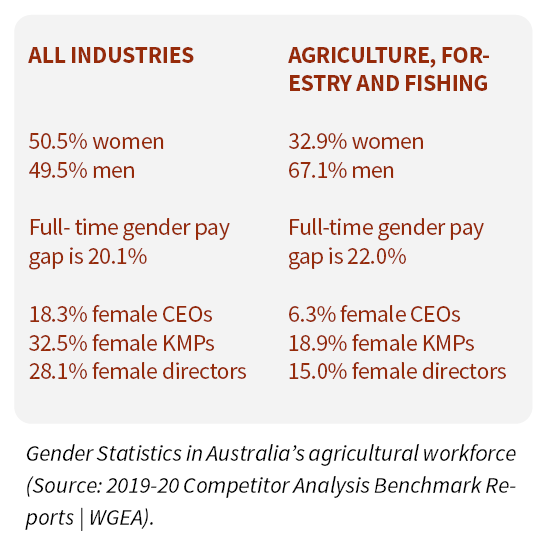1MG FlippingBooks
A Farmer’s Daughter – Travels from the paddock to the boardroom
A big part of innovation is reliance on diverse perspectives. In agriculture today, our greatest potential lies in gender equality on the farm and in agribusiness management.

From the Beginning – Everything Was a Possibility
Raised in a small rural community in Wisconsin’s Dairyland, USA, I lived in an environment where men, women, and children alike contributed to a successful household, family business, and community. Where working mothers woke at 4 am for farm chores, held an office job during the day, raised a family, and led major community programs every year. Alongside these role models in my early life, I also grew up with parents who taught me that opportunity and potential know no gender; for me everything was possible, from becoming a ballerina to an engineer, to taking over the family farm.
Today I am far away from my origins and now find myself one of less than 6 per cent of female CEOs in Australia’s agricultural industry. We are all born with potential, irrespective of gender; so where did things go wrong in the world of gender-balance as we migrate from the paddock to the senior management and Board positions in our sector?
Having studied mechanical engineering at university, my working life has always been very male-dominated and one that I have enjoyed. Early on in my career I often overlooked some of the bias and judgement which other helpful colleagues later pointed out.
I subsequently spent 15 years in various global businesses across Europe which exposed me to countless women who were succeeding in business. Usually, their success occurred by fitting the mould that society placed on them and as well as the stereotypes of many male leaders before them. I asked myself, over time, if this was an ideal way as a manager to maximize diversity and potential.
Defining moments have featured heavily throughout the 2.5 decades of my career such as reactions to pregnancy – a persistent and unresolved issue in maximising female participation in management. I was also inspired by male and female leaders who broke the mould, asserted themselves – spoke openly about entrenched corporate behaviours which inhibit women and reduce potential contribution to the shared goals.
Working across many different cultures in my career some of my favourite memories are from my time in Poland – where I managed a strong balance of male and female talent. And in South Asian countries too where trailblazing women were role modelling the way for more diversity, particularly in commercial roles influencing growers.
Across all the elements of diversity, which ultimately is about bringing truly new perspectives to solving problems, I have realised gender is the lowest “hanging fruit”. Low number of women in senior management roles, in particular, suggests that something isn’t working – that the talent pool to deliver innovative solutions is not being fully leveraged. A diverse team where all members stand up for what each believes in and speaking their minds creates a workplace where all individuals can truly thrive.

Calling all Inclusive Leaders to the Cause
During my 15-plus years’ experience in senior management roles, I’ve become convinced that the pathway to our industry’s future success is the rise of inclusive leadership across the whole value chain of agriculture and at all levels of the management hierarchy. More and more industry leaders now recognise there is a business case for inclusive leadership – the capacity to manage and lead a heterogeneous group of people efficiently, while respecting their uniqueness in an empathetic and bias-free way. Meaningful change is now happening in various areas such as such as a parental leave policy.
Let’s look at the practical elements to encourage such change. More education and rewards are needed to harness this early momentum. For example, inclusive leadership first requires intense curiosity – an enduring need to “ask why?”. Cognisance of bias, or leveraging self-awareness to avoid the leaders Achilles heel, is also a fundamental building block. Commitment, or in other words having strength, resilience, and perseverance to lead through good and bad times, is another. Taking personal risk , or simply courage, is the fourth. Cultural Intelligence, --- truly empathizing and understanding people of diverse backgrounds, is paramount.
And finally – collaboration which involves fully engaging in team work to create a greater outcome, is the fifth requirement. An industry that will always know drought, floods, volatility, trade wars, and other complex challenges will prosper with more of these inclusive leadership behaviours across the value chain.
To young rural women and men who might be growing up on a farm – be confident in all you do, never stop the child-like curiosity, break social norms and whatever you decide to do, go after it with commitment and courage. Opportunities see no gender – Australian agriculture needs the best from the paddock to the Board Room. Here is to a very bright future as we unlock the full human potential in Australian Agriculture!
“Kristina Hermanson is Head of Natural Capital, APAC & Africa at global asset management firm Nuveen - Nuveen is the world’s largest investor in farmland. Kristina is former Managing Director for FMC's ANZ and ASEAN business - FMC is part of a multi-national agricultural sciences company that advances farming through innovative and sustainable crop protection technologies.”














